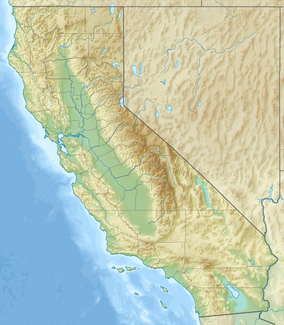Malibu Lagoon State Beach
| Malibu Lagoon State Beach | |
|---|---|
 | |
| Location | Los Angeles County, California, United States |
| Nearest city | Malibu, California |
| Coordinates | 34°2′0″N 118°40′45″W / 34.03333°N 118.67917°W |
| Area | 110 acres (45 ha) |
| Established | 1951 |
| Governing body | California Department of Parks and Recreation |
Malibu Lagoon State Beach in Malibu, California, United States, is also known as Surfrider Beach.[1] It was dedicated as the first World Surfing Reserve on October 9, 2010.[2] The 110-acre (45 ha) site was established as a California state park in 1951.[3] It lies within the Santa Monica Mountains National Recreation Area.
Natural history
[edit]Malibu Lagoon is an estuary at the mouth of Malibu Creek at the Pacific Ocean in Malibu. It is being restored by a multiagency partnership. Migratory birds use the lagoon when on the Pacific Flyway.[4] Snowy Plovers nest on the beach and are protected.[5]
Surfing
[edit]This section needs additional citations for verification. (December 2013) |
Malibu Lagoon is a famous right-break that had a big impact on the surfing culture in Southern California in the 1960s. Located near the Malibu Pier, it is among the most popular surf spots in Los Angeles County. The shoreline is usually triple-cornered due to the buildup of silt, sand, and cobble at the mouth of the creek. The tapering, smooth-breaking waves are recognized among surfers worldwide as the gold standard for summertime "point" surf.
Malibu Lagoon has three primary surfing areas. First Point has waves popular with longboarders and shortboarders during bigger swells.[6] Second Point is used for high performance surfing. It has a main takeoff that lines up and connects into the inside called the "kiddie bowl". Third Point has a left and right side. On the south swells most common in late August and September, surfers can ride all the way to the pier.
See also
[edit]References
[edit]- ^ McKinney, John. "Malibu Beach Trail". Day Hiker's Guide to California State Parks. California State Parks. Retrieved December 14, 2013.
- ^ "Malibu World Surfing Reserve Dedication". World Surfing Reserves. March 10, 2012. Archived from the original on July 16, 2012. Retrieved March 11, 2012.
- ^ California State Park System Statistical Report: Fiscal Year 2009/10 (PDF) (Report). California State Parks. p. 16. Retrieved December 14, 2013.
- ^ Santa Monica Mountains NRA, draft Natural Resource Management Plan/Environmental Assessment, National Park Service, September 1982, retrieved January 20, 2018
- ^ Sahagun, Louis (May 9, 2017). "Rare birds find Southern California beach housing". LA Times. Retrieved August 26, 2017.
- ^ "Surf Break Maps: Malibu Point, Malibu, Los Angeles County, California". Socalsurf.com. April 6, 2008. Retrieved December 14, 2013.
External links
[edit]- 1951 establishments in California
- Beaches of Southern California
- California State Beaches
- Malibu, California
- Parks in Los Angeles County, California
- Santa Monica Mountains National Recreation Area
- Surfing locations in California
- Beaches of Los Angeles County, California
- Tourist attractions in Malibu, California


